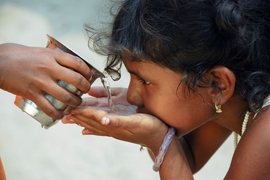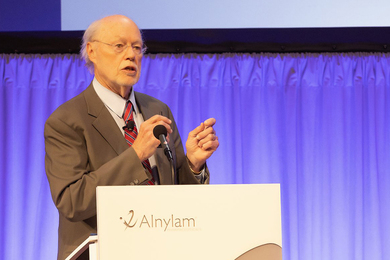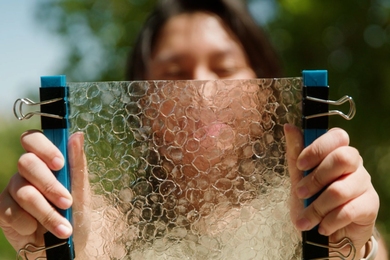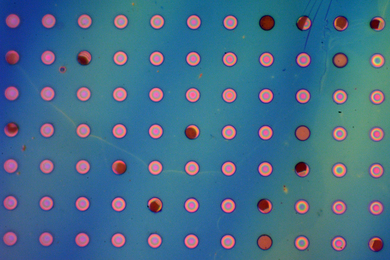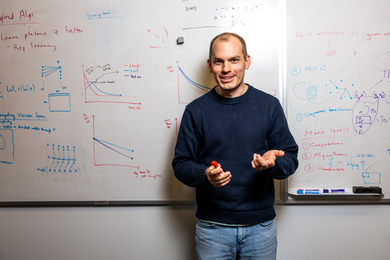The Abdul Latif Jameel World Water and Food Security Lab (J-WAFS) has announced four new grant recipients in its J-WAFS Solutions program. J-WAFS Solutions is sponsored by Abdul Latif Jameel Community Initiatives, and provides commercialization grants to help develop products and services that will have a significant impact on water and food security, with related economic and societal benefits.
The program, managed by the MIT Deshpande Center for Technological Innovation, is in its second year. Like direct Deshpande grants, the goal of the funding is to advance a technology to the point where it can attract customer interest and investments to commercialize a product and launch a spinout company, and/or to license the technology to an existing organization. Funds support work to refine and enhance an innovation, systematically explore potential markets, and assess commercial viability, whereby the technology and market risks are sufficiently reduced.
The four new grants go to faculty in the departments of Chemical Engineering, Chemistry, and Mechanical Engineering. John H. Lienhard V, director of J-WAFS and the Abdul Latif Jameel World Water and Food Security Professor, says that MIT faculty continue to devise innovative technologies that are applicable to a range of challenges in the food and water sectors:
“Commercializing effective technologies with sound business models is one of MIT’s most effective mechanisms to have a positive impact on the world,” he says. “The J-WAFS Solutions program is helping not only to stimulate creative problem solving, but also to support entrepreneurial faculty and students who are motivated by problems of global importance.”
Following on prior J-WAFS seed funding, Alan Hatton, the Ralph Landau Professor of Chemical Engineering Practice, has been awarded a commercialization grant for the development of an affordable and robust purification technology. Seeing a need for separation technologies that can be applied to water purification needs in a range of contexts — from point-of-source treatment to remote in-situ purification devices to large-scale, centralized wastewater treatment facilities — the lab has been developing electrochemically-mediated adsorptive processes for water treatment. J‑WAFS Solutions funding will support the development of a demonstration unit and exploration of commercial application opportunities.
A new project led by Rohit Karnik, associate professor in the Department of Mechanical Engineering, and co-PI Amy Smith, senior lecturer in the Department of Mechanical Engineering and co-director of D-Lab, takes a very different approach to water purification. Addressing the largely unmet need to provide safe and affordable drinking water to very low-income groups, Karnik is developing low-cost water filters that exploit the natural filtration capabilities of xylem tissue in wood. Particularly in regions lacking access to piped water supply systems, microbial contamination is a major threat to health. With J-WAFS Solutions funding, Karnik’s lab will work with Amy Smith to validate filtration performance in the lab and in the field, while also assessing the usability, desirability, and affordability of low-cost filters and devising a strategy for local manufacture and commercialization.
Gang Chen, the Carl Richard Soderberg Professor in Power Engineering and head of the Department of Mechanical Engineering, was funded for his proposal on “Floating, Heat Localizing Solar Receivers for Distributed Desalination.” The lab’s invention is a wavelength-selective, insulating, solar powered still (WISPS) tarp structure that can blanket ocean, lake, and pond surfaces to generate freshwater onsite. The project addresses the challenges associated with scalability, cost, and water safety associated with seawater desalination by capitalizing on a recent innovation by Chen that achieves high evaporation rates and high efficiency by localizing high temperatures to the water surface.
The fourth funded project addresses the need for simple and rapid detection of pathogenic bacteria in food and water samples in order to prevent widespread infection, illness, and even death. Using a carbohydrate array detection scheme based on specific binding interactions of bacteria with carbohydrates, Timothy Swager, the John D. MacArthur Professor of Chemistry, and Alexander M. Klibanov, Novartis Professor in Chemistry and Bioengineering, are developing a system that will be able to simultaneously detect multiple types of pathogenic bacterial strains. The project will focus initially on the occurrence of food poisoning from ground beef — a common problem because of the prevalence of E. coli contamination in beef and dairy cattle and because bacteria that may only be on the surface and readily killed by cooking become dispersed throughout the meat during the grinding process.
A one-year renewal grant was awarded for another project that is pursuing point-of use identification of contaminants in drinking water and food through a different technology. Jointly led by Professor Michael S. Strano of the Department of Chemical Engineering and Professor Anthony Sinskey of the Department of Biology, this interdisciplinary project is leveraging new MIT nanotechnology to develop a single integrated platform that can address all important food and water contaminants — including bacterial pathogens, heavy metals, and allergens — in a low cost, widely deployable nanosensor array.
Renee J. Robins, executive director of J-WAFS, noted that the new projects span various aspects of ensuring a safe supply of water and food:
“Whether the issue is clean water for a rural village in India or enjoying a juicy hamburger cooked on the grill without fear of food poisoning, MIT researchers are developing technologies that will greatly improve people’s ability to have clean water and safe food at their ready disposal,” she says.

